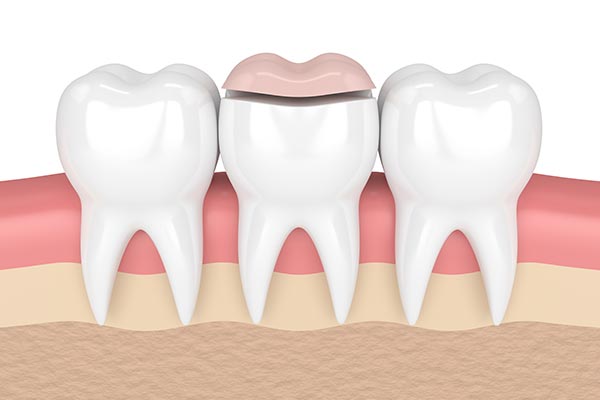The similarities and differences between inlays, onlays, and crowns
Inlays and onlays achieve many of the same results as crowns, to the extent that they are sometimes referred to as partial crowns. All these types of tooth restoration strengthen damaged teeth and look natural, but inlays and onlays differ from crowns in a few key ways.
Restoration method
Crowns cover the entire tooth to the gum line and can be used to cap teeth that have suffered extreme damage or even as replacements for missing teeth. Inlays and onlays are placed, respectively, in or on the existing tooth. Patients can be recommended these treatments as an alternative to crowns if the tooth structure is still intact. Both procedures restore full functionality and appearance to a patient's tooth, but the crown covers the tooth entirely whereas inlays and onlays work with the existing tooth structure.
Materials
Inlays and onlays can be made of a variety of materials, including gold, ceramic, porcelain, or resin, the same as crowns. In the past, gold crowns and inlays were more common, but nowadays most patients opt for porcelain, resin, or ceramic. These materials can be colored to look indistinguishable from a patient's natural teeth. They are also very durable, lasting for years at a time, and require no more maintenance than regular teeth.
Preparation
Inlays, onlays and crowns all require a thorough examination and cleaning of the patient's teeth. This involves the removal of decay as well as any weak part of the tooth. Crowns have specific requirements in this regard because they have a minimum thickness. After this step the cosmetic dentist will have a good idea of the state of the tooth and will move on to taking impressions. A bite registration is also recorded so the dentist can know how the patient's teeth are aligned.
Procedure
The procedure for inlays, onlays, and crowns is very similar. Many cosmetic dentists have a milling machine in the office that can mill all three pieces. This allows for single-visit restorations. At an appointment, pictures are taken for the CAD/CAM milling machine. Then the piece is milled on site quickly enough for the cosmetic dentist to bond it before the patient leaves.
If an office does not have a milling machine, the patient can make two visits. During the first, pictures are taken, and a second appointment is scheduled after the new inlay, onlay, or crown arrives from the lab. In this case the patient is fitted with a temporary crown in between visits.
Conclusion
Inlays and onlays can be used as a viable alternative to crowns if a patient has a salvageable tooth structure. Patients should consult with a cosmetic dentist to find the solution that is most desirable and suitable for them.
Request an appointment or call McCarthy Dentistry at 740-546-5178 for an appointment in our Marietta office.
Recent Posts
Seeing a new dentist for general or cosmetic dentistry can be an anxiety-inducing experience, especially if your appointment is for something new or for something that you are not familiar with. If you are visiting a cosmetic dentist for the first time, it can be helpful to learn a little bit about what this field…
A beautiful smile can be a powerful asset. It can affect first impressions, social interactions, and even your self-esteem. A cosmetic dentist improves the look of teeth and provides solutions to turn ordinary smiles into extraordinary ones. The treatment options typically depend on your preferences and needs.Patients looking to transform their smiles can book an…
A cosmetic dentist can repair your cracked tooth. This dental damage can result from an injury or accident. Correcting the situation is possible with the right treatment. Here are the details on how your cosmetic dentist can treat your cracked tooth.These thin shells cover the front side of the teeth. The cosmetic dentist can use…


